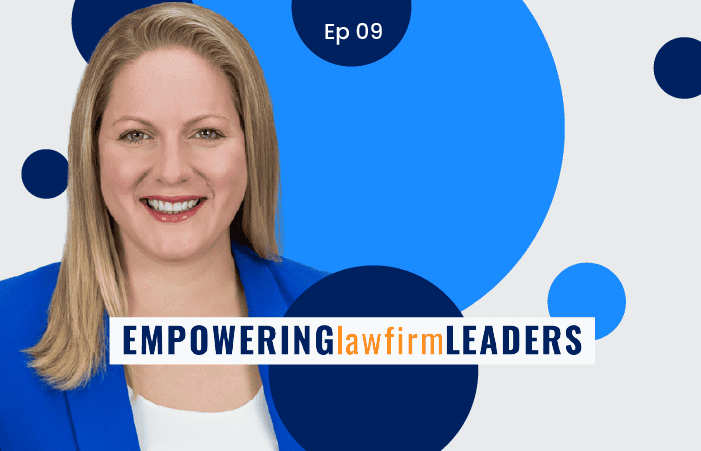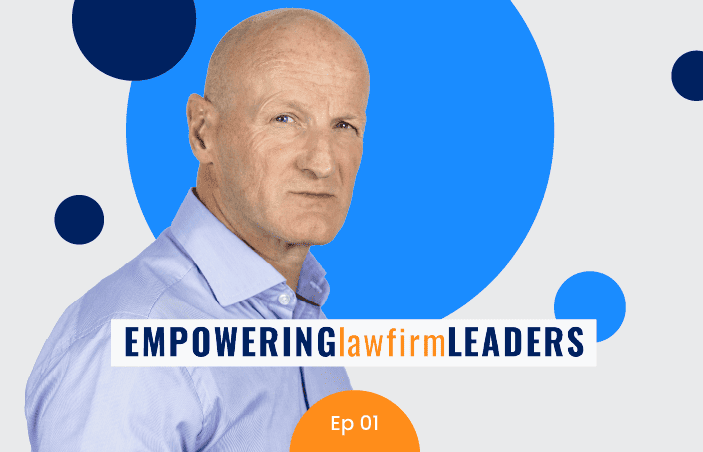Contents
Master the business of law: Fundamentals and best practices
In Episode 12 of the Empowering Law Firm Leaders podcast, James Markham and Darren Mee, authors of The Legal MBA, offer expert insights on mastering the business side of law. Drawing from their extensive experience, they share practical advice for running a successful law firm.
James and Darren discuss common pitfalls to avoid, standout practices they’ve observed in top-performing firms, strategies to thrive in a competitive market, and the critical role of aligning team behaviours with the firm’s strategic goals.
In this conversation we cover:
- Strategies to differentiate your firm beyond “people”
- How to align team behaviours with your strategy
- Creating and implementing effective service propositions
- Tips for creating effective process maps
- How to decide what tasks are worth automating
Essentials for being successful in the business of law
James and Darren shared stand-out examples of exceptional practice from SME law firms they’ve worked with. Darren shared, “The beauty of working with so many firms is that you see all the common pitfalls, but you also see examples of exceptional practice.” Here are their top four examples:
- Prioritisation and delegation: James recounted working with a practice group leader who balanced a full fee-earning portfolio, managed a sizable practice group, and handled personal responsibilities as a single mother. “She had real clarity in each of those three areas about what she was doing, who she was serving, and what she was not doing,” James explained. This clarity allowed her to delegate effectively and maintain high performance across all areas. This skill is crucial for maintaining efficiency and effectiveness in a law firm.
- Financial hygiene: Darren emphasised the importance of getting the basics right, such as timely billing and managing work-in-progress (WIP). He noted that while these practices might seem superficial, they are crucial for maintaining financial health. “Getting their financial hygiene right, getting the bills out on a timely basis, managing WIP… all those kind of things are really, really important,” Darren explained. These practices ensure that firms maintain a steady cash flow and avoid financial pitfalls.
- Client-centric approach: Darren emphasised the importance of understanding and addressing client needs. “The firms that I see, that really get this right, start by answering two questions very clearly: Who is it that we serve? And what do we offer?” By focusing on these questions, firms can align their services with client expectations and deliver exceptional value.
- Strategic focus: Both James and Darren agreed that having a clear strategic focus is crucial. Darren noted, “It’s about having a clear vision and being consistent in execution. Sometimes, it’s not about saying no to good ideas but about prioritising and saying ‘not now.’” This approach ensures that firms remain focused on their strategic goals while still being open to innovation and improvement.
Differentiating your firm beyond ‘people’
To help firms be competitive against the other 10,000 law firms in the UK, James and Darren discussed the strategies needed to differentiate. James pointed out that relying solely on the quality of your people is not enough. “If everyone’s saying it, it can’t really be that much of a differentiator. The real trick is to step outside of that internal view and look externally. This means putting your feet in the shoes of your client and talking directly to their needs.”
Darren added that focus is key. “Whether it’s industry or sector, the narrower you can make that specialism, the more effective you become. For example, being the go-to firm for M&A in chiropractic care centres allows you to target your marketing, hiring, and service propositions more effectively.” This focused approach helps firms stand out in a crowded market by demonstrating deep expertise in specific areas.
Aligning team behaviours with strategy
Ensuring that your team’s behaviours and habits align with the firm’s strategy is crucial for consistency and effectiveness in your brand. All touchpoints you have with potential and existing clients influences people’s perception of your brand, services, prices etc.
James highlighted common mistakes firms make, such as not having a strategy or failing to communicate it effectively. “It’s crucial to ensure that the strategy is understood and bought into by all partners. This requires aligning the strategy with practice group specialisms and making it clear what should and shouldn’t be done.”
Darren pointed out the challenge of managing the tension between good ideas and strategic alignment. “It’s about having a clear vision and being consistent in execution. Sometimes, it’s not about saying no to good ideas but about prioritising and saying, ‘not now.’” This approach ensures that the firm remains focused on its strategic goals while still being open to innovation and improvement.
Creating effective service propositions
A well-defined service proposition is essential for addressing client needs and driving efficiency. Darren explained, “A service proposition addresses a particular problem or need for a client. It should articulate the problem, how you can help, and the journey from problem to solution. Importantly, it should have a fixed fee or value-based commercial arrangement to avoid inefficiencies.”
James added that creating a value ladder can help firms map out how they can assist clients at each stage of their journey and at different price points. “It starts with free educational content and moves up to core offers and high-value bespoke services.” This structured approach ensures that clients receive value at every stage, enhancing their overall experience and satisfaction.
About the speakers

James Markham is a seasoned professional who originally trained as an accountant. His career journey includes significant roles at Baker Tilly (now RSM), Hogan Lovells, and Dentons, where he focused on practice management, commercial finance, legal project management, and innovation. James’s experience is enriched by his MBA from Henley Business School, which broadened his understanding of running a business beyond technical expertise.

Darren Mee has a background in consulting, with extensive experience working with law firms since the last recession. As a former partner in a large accountancy firm, Darren understands the multifaceted challenges lawyers face, from technical expertise to business development and team management. His passion for equipping lawyers with essential business skills led to the creation of “The Legal MBA.”
A clear service proposition not only benefits clients but also has a significant impact on internal operations. James noted, “A clear service proposition ensures consistency across the firm. For example, if you promise clients 24/7 availability, you need to align this with your staff’s work-life balance. Similarly, if you charge premium prices, you need to pay your staff accordingly. This alignment helps in managing expectations and ensuring sustainable growth.”
Darren emphasised that a predictable pipeline of opportunities is crucial for employee well-being. “By making processes more repeatable and efficient, you free up your experts to focus on high-value tasks, enhancing both client satisfaction and employee engagement.” This approach helps firms maintain a healthy work environment while delivering exceptional service to clients.
Creating effective process maps
Many reports, including the LPM Frontiers and Lexis Bellwether, highlight that many firms are planning to increase their tech spend over the next 12 months. In the operations chapter of The Legal MBA, it emphasises that process mapping is a critical step before implementing any technology.
James and Darren stressed the importance of understanding your current processes before making changes. James advised, “Start at the high level and then work out where the impact is. Process maps are a communication tool and a change management tool.”
Darren added, “You need different levels of process maps. A high-level map gives an overview, while detailed maps provide step-by-step instructions. This helps in identifying areas for improvement and ensuring that everyone understands the changes.” This can be useful when implementing new tech tools, but also for adapting or amending the process itself, scaling the process across the team, or introducing new team members to the process.
Tips for automating tasks and processes in your law firm
Prioritisation is key to effective automation. James suggested looking for tasks that are high frequency and time-intensive. “The goal is to ensure that the time saved by automation is greater than the time spent implementing it.”
Darren emphasised the importance of focusing on repeatable tasks. “Automation should focus on tasks that can be standardised, allowing experts to concentrate on bespoke, high-value activities. This approach improves efficiency without commoditising the service.”
Master the business of law to stay competitive
Mastering the business of law requires a strategic approach, clear service propositions, and effective use of technology. By focusing on client needs, aligning team behaviours, and prioritising automation, law firms can navigate the complexities of the modern legal landscape and achieve long-term success.
Watch the full interview with James Markham and Darren Mee now to discover more advice and guidance on mastering the business of law.




